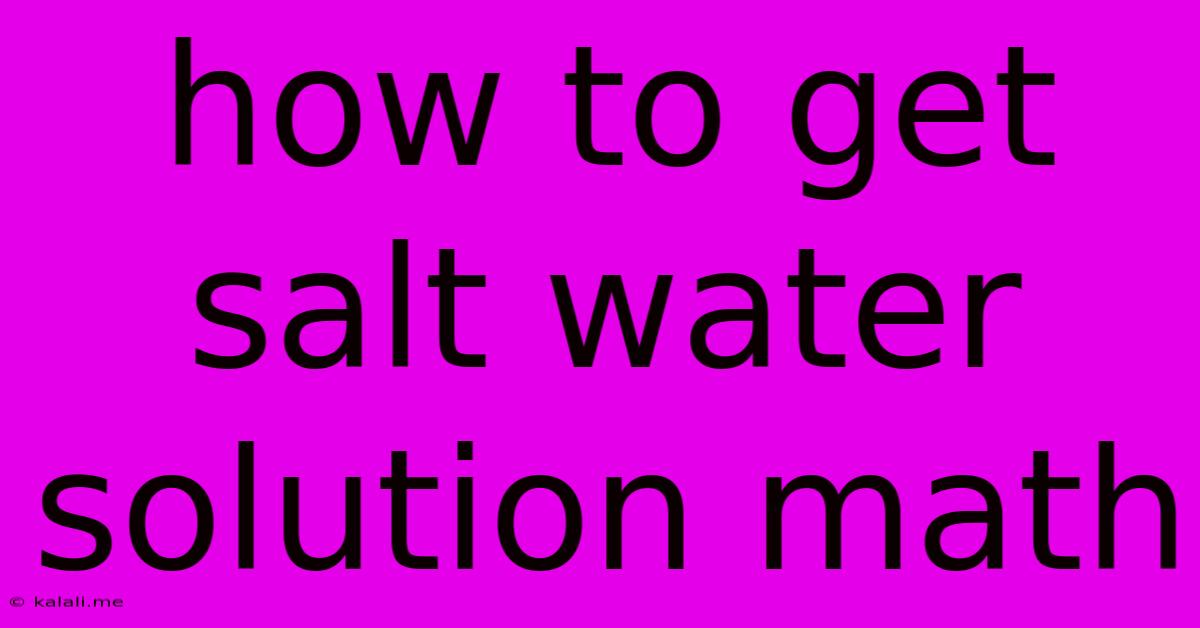How To Get Salt Water Solution Math
Kalali
Jun 01, 2025 · 3 min read

Table of Contents
How to Calculate the Concentration of a Saltwater Solution: A Comprehensive Guide
Meta Description: Learn how to calculate the concentration of a saltwater solution using various methods, including molarity, molality, and percentage by mass. This guide provides clear explanations and examples to help you master this essential chemistry concept.
Saltwater solutions are ubiquitous in various scientific applications and everyday life. Understanding how to calculate their concentration is crucial for accurate experiments and practical applications. This guide will walk you through different methods for determining the concentration of a saltwater solution (assuming the salt is NaCl, sodium chloride). We'll explore molarity, molality, and percentage by mass, equipping you with the knowledge to tackle any saltwater concentration problem.
Understanding Concentration
Before diving into the calculations, let's clarify what we mean by "concentration." Concentration refers to the amount of solute (salt, in this case) dissolved in a given amount of solvent (water). The higher the concentration, the more solute is present in the solution.
Method 1: Molarity (M)
Molarity is the most common way to express concentration in chemistry. It represents the number of moles of solute per liter of solution.
Formula: Molarity (M) = moles of solute / liters of solution
Steps:
- Determine the moles of solute: You'll need the mass of salt (NaCl) and its molar mass (approximately 58.44 g/mol). Use the formula: moles = mass (g) / molar mass (g/mol)
- Determine the volume of the solution: Measure the total volume of the saltwater solution in liters.
- Calculate the molarity: Divide the moles of solute by the liters of solution.
Example:
Let's say you dissolved 11.69 g of NaCl in enough water to make 500 mL of solution.
- Moles of NaCl: 11.69 g / 58.44 g/mol = 0.2 moles
- Liters of solution: 500 mL = 0.5 L
- Molarity: 0.2 moles / 0.5 L = 0.4 M
Therefore, the concentration of the saltwater solution is 0.4 Molar.
Method 2: Molality (m)
Molality expresses the number of moles of solute per kilogram of solvent (water). Unlike molarity, molality is not affected by temperature changes.
Formula: Molality (m) = moles of solute / kilograms of solvent
Steps:
- Determine the moles of solute: Same as in the molarity calculation.
- Determine the mass of the solvent: Weigh the mass of water used in kilograms.
- Calculate the molality: Divide the moles of solute by the kilograms of solvent.
Example:
If you dissolved 11.69 g of NaCl in 1 kg of water:
- Moles of NaCl: 0.2 moles (as calculated previously)
- Kilograms of solvent: 1 kg
- Molality: 0.2 moles / 1 kg = 0.2 m
The molality of the solution is 0.2 molal.
Method 3: Percentage by Mass (% w/w)
Percentage by mass expresses the mass of solute as a percentage of the total mass of the solution.
Formula: Percentage by mass (% w/w) = (mass of solute / total mass of solution) x 100%
Steps:
- Determine the mass of solute: Weigh the mass of salt.
- Determine the mass of the solution: This is the sum of the mass of the solute and the mass of the solvent.
- Calculate the percentage by mass: Use the formula above.
Example:
If you dissolved 10 g of NaCl in 90 g of water:
- Mass of solute: 10 g
- Total mass of solution: 10 g + 90 g = 100 g
- Percentage by mass: (10 g / 100 g) x 100% = 10%
The solution is a 10% (w/w) saltwater solution.
Choosing the Right Method
The best method for expressing concentration depends on the specific application. Molarity is frequently used in chemistry, while molality is preferred when temperature changes are significant. Percentage by mass is straightforward and often used in practical settings. Understanding all three methods provides a comprehensive understanding of saltwater solution concentration.
Latest Posts
Latest Posts
-
When Can An Approach Be Attempted
Jun 03, 2025
-
Whats The Difference Between Doves And Pigeons
Jun 03, 2025
-
Can I Skim Coat A Concrete Wall By Myself
Jun 03, 2025
-
How To Cut Hole In Drywall For Outlet
Jun 03, 2025
-
Can A 3 Way Switch Be Used As A 2 Way
Jun 03, 2025
Related Post
Thank you for visiting our website which covers about How To Get Salt Water Solution Math . We hope the information provided has been useful to you. Feel free to contact us if you have any questions or need further assistance. See you next time and don't miss to bookmark.